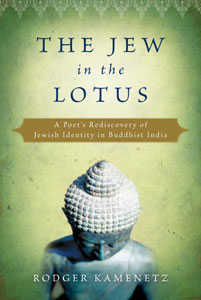The Jew in the Lotus - Book Review
One day, after we had secured our new house, I was out running in the morning. As I ran through an unfamiliar neighborhood, a small older lady said something to me as I ran by. To be polite, I pulled out my earphones and turned down the music booming through my Droid X.
She offered to walk back in the direction I was headed and she let her small Yorkshire Terrier amble about at her feet. As we walked, I noticed that she spoke in religious terms and asked her about her faith. She seized the opportunity and told me that she was a spiritually intuitive Jew. Such a comment really spiked my interest and we made small talk until I was able to introduce her to my wife.
She told me of a book that I should read. I told her I enjoyed reading and she promised to deliver same to me. Little did I know that she would produce the book within the selfsame hour.
The Jew in the Lotus was quite interesting. My review is enclosed below. I hope you enjoy. Feel free to leave comments.
The Jew in the Lotus [Softcover] Nonfiction
Nonfiction
She offered to walk back in the direction I was headed and she let her small Yorkshire Terrier amble about at her feet. As we walked, I noticed that she spoke in religious terms and asked her about her faith. She seized the opportunity and told me that she was a spiritually intuitive Jew. Such a comment really spiked my interest and we made small talk until I was able to introduce her to my wife.
She told me of a book that I should read. I told her I enjoyed reading and she promised to deliver same to me. Little did I know that she would produce the book within the selfsame hour.
The Jew in the Lotus was quite interesting. My review is enclosed below. I hope you enjoy. Feel free to leave comments.
-------------------------------------------------------------------------------------------
 |
| Available at Amazon.com |
by Rodger Kamenetz
304 pages
ISBN-13: 978-0060645748
Review by Steven King, MBA, MEd
Religious faith without conviction seems to be antithetical to the very essence of conviction. Perhaps blind adherence to religious principles is the most restrictive philosophy adopted by a particular religion’s devotees. As a Christian, this writer feels compelled to make a disclaimer – adherence to Christianity requires exclusivist thinking. To follow Jesus implies that the devotee has accepted the scriptural tenet which Christ spoke, “I am the way, the truth, and the life. No one comes to the father but through me.” [John 14:6]
Does such faithful adherence imply that no truth can be found in other religious expression? Of course not, but truth seldom intrudes where a locked mind exists. In the words of J.L. Borges: Truth never penetrates an unwilling mind.
The Jew in the Lotus is a fascinating discovery of what occurs when a diversified group of Jewish rabbis travel to India to have an exclusive meeting with the Dalai Lama, the religious and political leader of Tibetan Buddhism. Although this pilgrimage to Dharamsala, the seat of the Tibetan political administration in exile, occurred in 1990, the discoveries unfolded serve as a type of road map for pluralistic religious discussion.
At the heart of the book, Judaism meets Buddhism. What could these religious expressions have in common at all? Without trying to exhaustively detail the tenets of either religion, the first asserts that the pathway to God is accomplished by knowing and following his will as revealed in the Tanakh, a slightly altered derivation of the Christian Old Testament. The latter believes that life is marked by suffering and its purpose, in this life or another, is to follow the Eightfold Path to ameliorate suffering and to help all attain enlightenment, or Nirvana. From the outset, most would believe that there were very little points of convergence. As you read the story of this classic meeting, you see a different characterization unfolding.
The greatest convergence of these two diametrically opposed religious expressions is the reality of surviving in exile. For many centuries, Jewish people have been scattered worldwide via the Diaspora and have maintained their religious and cultural identity. Such survival expertise intrigued the Dalai Lama as he sought a way to keep his people inclined to their religious expression while in exile.
Another point of convergence surrounds their common belief that a type of exoteric enlightenment occurs via meditation, where both groups are attempting to quantify truth via ritualistic means. It is instructive that the term Jubu, which characterizes a Jew who practices Buddhism, was made famous by the narrative of this book.
Perhaps due to his proclivity for poetry, Kamenetz’s prose seems unnecessarily lengthy in places. The reader should give him a wide birth as this tome reflects his rediscovery of his Jewish identity through Buddhism. Fortunately, for Kamenetz this trip helps him to veer away from a progressive atheism toward his religious heritage.
Kamenetz goes to great lengths to preserve many quotes from the liaison between the travelling Jews and the Dalai Lama. Many of these quotes will cause you to ponder: how is my religious expression practically working out in my life?
Author’s website: http://rodgerkamenetz.com


This is a wonderful book
ReplyDelete